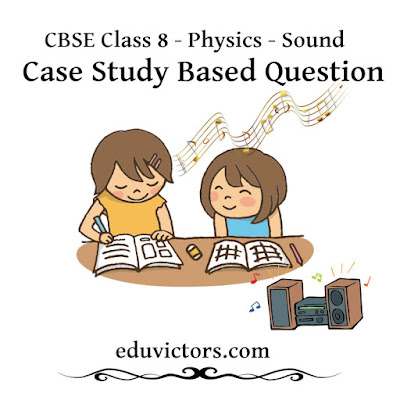CBSE Class 8 - Physics - Sound - Case Study Based Question
Q1. Read the following and answer the questions given below:
Sound is a form of energy that is produced when air molecules vibrate in a particular pattern called waves. Hence, the sound is a wave. Sound is produced by vibrating objects. Vibration can be described as to and fro motion of an objects. Sound cannot be produced without any vibrations. Sound always requires a medium to travel from the source of its production to the receiver end. Speed of the sound is maximum in solids and minimum in gases.
(i) The audible frequency range of a human ear is:
(a) The range of audible frequency of human ear is 20 to 200 Hz
(b) The range of audible frequency of human ear is 2 Hz to 20 Hz
(c)The range of audible frequency of human ear is 200 to 2000Hz.
(d) The range of audible frequency of human ear is 20 to 20,000Hz
(ii) Ria used a device to measure the loudness of a machine. She recorded her observation as given below. Which of the following represents the correct measurement of loudness?
(a) 80 Hz
(b) 80 s
(c) 80 dB
(d) 80 k
(iii) Arrange the speed of sounds in solids, liquids and gases in an ascending order:
(a) Gas < Liquid < Solid
(b) Liquid > Gas > Solid
(c) Liquid < Solid < Gas
(d) Solid > Liquid > Gas
(iv) The number of vibrations made by a vibrating body in one second is:
(a) frequency
(b) noise
(c) loudness
(d) pitch
Answers:
1. (d) The range of audible frequency of human ear is 20 to 20,000Hz
2. (c) 80 dB
3. (a) Gas < Liquid < Solid
4. (a) frequency
👉See Also:
Ch 13 - Sound (Q & A)
Ch 13 - Sound (MCQs)
Ch 13 - Sound (Worksheet)
Ch 13 - Sound (Question Bank)
Ch 13 - Sound (Worksheet)
CBSE All In One NCERT Based Science Class 8 2022-23 Edition

No comments:
Post a Comment
We love to hear your thoughts about this post!
Note: only a member of this blog may post a comment.